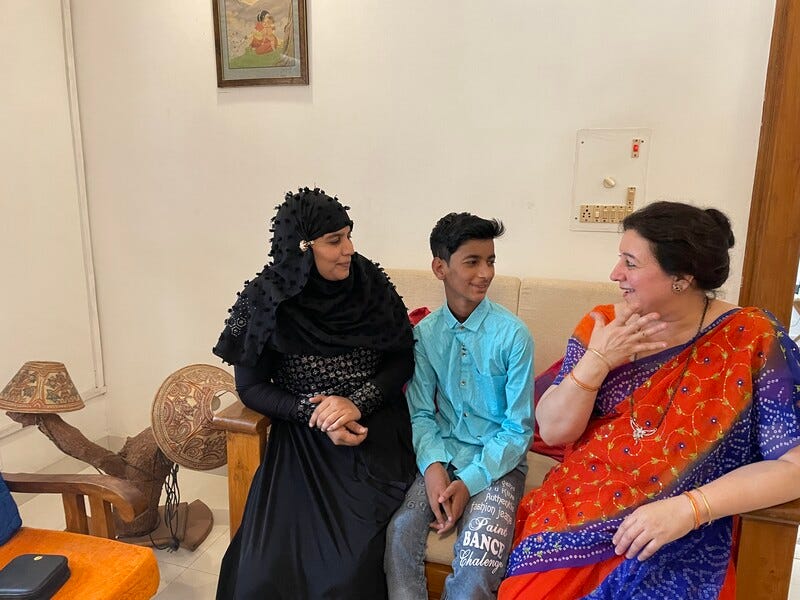The CEO in Every Home: Celebrating Mothers
Leading with Love: Uncovering the Leadership Lessons from Motherhood
Ma, you taught me the power of perspective.
The boardroom or bedroom? If you had asked me where I learned my first leadership lesson, I would undoubtedly point to the latter. Picture a typical Indian mother, firm and relentless, reproaching me for my audacious childhood escapade - stashing my notebooks in a tree to evade the dreaded question, "Is there any homework in your bag?" Although stern in her admonishment, I caught a hint of a chuckle in her voice when she thought I was asleep. A lesson in life's duality - the ability to be stern yet understanding, disciplined yet adaptable, and exasperated yet proud.
Ma, you taught me the value of empowerment.
In the world according to Ma, love was not just a feeling but a task, an arduous one at that. A task not of doing, but of enabling others to do. She would whip up my favorite meals and then nudge me to excel in the subjects I claimed to be good at. "I don't need a know-it-all," she would say, "but if you say you know something, then show it." This is how she taught me accountability, a lesson for a lifetime.
And when I ventured into the enigmatic realm of computers and technology, her unwavering support remained, even when the jargon went way over her head. She might not have understood the exhilarating thrills of code lines or the intricacies of algorithms, but she believed in me, and that was enough. She armed me with the tools I needed to learn and celebrated my small victories enthusiastically. It was only when I embarked on my MBA journey that I realized her approach was eerily similar to that of successful start-up investors. They bet on the person, not just the idea. And so, my mother did with me.
Ma, you taught me the power of sharing, of being a better ally.
Growing up, our home was a revolving door of visitors. Although I occasionally grumbled about the lack of privacy, my mother would counter with the Sanskrit phrase, "Atithi devo bhava" (The guest is equivalent to God). Our dining table became a platform for enriching conversations, a hub of shared experiences and knowledge. It was here, amid the chatter and laughter, that I first learned about computers. Who could have imagined that in a family surrounded by doctors, I would find my passion in technology?
This constant influx of people into our lives underscored the importance of being part of a community or a tribe. However, it was my mother's actions that taught me the true value of a tribe lies not just in receiving, but in giving back. When you find your tribe, you're not just a member; you become a steward of its values, responsible for its growth and well-being. This realization formed the bedrock of my interactions as I navigated life, shaping me into a better ally, a better leader, and a better human being.
Ma, you taught me the power of compassion and the joy of giving.
Among the many faces that passed through my mother's preschool was Salman, a bright-eyed boy with a captivating smile, but with a world of silence enveloping him. Born with a hearing deficiency, Salman relied on a hearing aid to navigate the sounds of life.
When the pandemic hit, like a tsunami leaving devastation in its wake, Salman's family found themselves in dire straits. The hearing aid, a lifeline for Salman, became a luxury they could ill afford.
One day, I received a call from my mother. Her voice, usually filled with cheer, was serious. There was a request, and yet, it was more of an instruction. The request was simple: Salman needed a new hearing aid, and we were going to help.
My mother's steadfast determination was as humbling as it was inspiring. Within weeks, she had coordinated the efforts and managed to secure the device Salman so desperately needed.
When the local newspapers published the story, my mother, ever the humble soul, remained in the shadows. She was not interested in the fleeting glow of public recognition. Instead, she basked in a quieter, more profound joy, the joy of knowing that her student could once again hear the world around him.
This was a lesson that went beyond classroom teaching, a lesson in empathy, kindness, and the transformative power of giving. In those moments, I realized my mother was not just a teacher or a caregiver. She was a change-maker, using her power to make a tangible difference in the lives of those she cared for.
And that's another valuable lesson from my mother: success is not always about being at the top; it's about helping others to rise.
Ma, you taught me that being a mother is a mindset, transcending biological or gender roles.
Your lessons came to life in an unexpected setting - the challenging terrain of building a startup in Western UP, India. As we adopted our ancestral villages during the health camps of 2013 and 2014, I found myself leading a team of 40 on-ground staff and countless others who trusted me to guide them. This wasn't just managing; it was nurturing. The villages we adopted, they were my children, and you had prepared me for this role by embodying the mother mindset.
The mother mindset is not confined to a gender or biological connection. It's an inclusive role that anyone can adopt. It's about dedication, love, sacrifice, and prioritizing others' needs. It's about providing guidance when paths are blurry, and support when the journey is tough.
When my investors proposed pivoting our startup's focus towards a sales forecasting tool, straying away from our core mission of preventive interventions, you never told me what to do, but your values did. Walking away from the funding was a challenging decision as a startup founder, but as your son, it was the simplest decision I ever made.
I would be labelled as a failure in the startup world, but I could not accept the idea of monetizing my own children, the villages we had adopted, by letting them fall ill when we had the means to prevent it. My decision was rooted in your teachings - your nurturing had become my north star, guiding me even in the most challenging situations.
Ma, you taught me to look beyond the bottom line and "money-exchanging-hands" metrics.
In a world often obsessed with numbers and productivity, where Neo-Taylorism's shadow of efficiency and optimization looms large, my mother introduced me to a different kind of equation. One that doesn't necessarily have a tangible output, but an immeasurable and profound impact.
Neo-Taylorism, grounded in Frederick Taylor's Scientific Management theory, stresses the importance of maximizing efficiency and productivity, often at the expense of the human element. My mother, however, championed a more holistic approach, where the 'human element' took center stage. She understood, with an innate wisdom, that we would be more productive and efficient if we were happy, and that our efficiency and productivity would translate into something valuable only if we were kind.
She acted as an unconventional investor, placing her bets not on stocks or bonds, but on my sister and me. Our success was her output, her joy and pride the carry. She wasn't concerned with the efficiency of our pure economic output, but with our growth, happiness, and the kindness we demonstrated to others. This was her own version of an economy, one that trades not in dollars or rupees, but in love, laughter, and life lessons.
The COVID-19 pandemic has brought the importance of this emotional wealth into sharp relief. We've come to understand that the depth of our relationships, the strength of our communities, and our collective empathy are just as, if not more, valuable than any economic indicator.
Ma, you taught me that mothers lay the foundation of this economy of empathy. They teach us that wealth extends beyond material prosperity. It's about shared laughter, comforting hugs, pride in achievements, and the unconditional love that defines our lives.
This Mother's Day, let's commit to recognizing this. Let's remember that our success, our achievements, our growth, are largely thanks to those who have nurtured us and instilled in us values beyond measure.
Let's acknowledge that wealth includes emotional richness, empathy, and unconditional love. Let's honor those who have nurtured us, recognizing that the true wealth of a nation lies in the happiness of its people and the depth of its empathy.
My mother may not have run a publicly traded corporation, but as the first CEO of my life, before handing over the reins to me, her immeasurable contribution is the greatest gift I've ever received. Let's ensure that love, care, and empathy are recognized as the vital economic forces they truly are.
And to my mother, thank you, for everything. Happy Mother's Day!
{Human: This one was the longest ever prompt engineering session yet. It took me 4 days, multiple threads, and I almost instructed it to write the words, word by word and it’s still not in a place where it does justice to what I want to write.}









